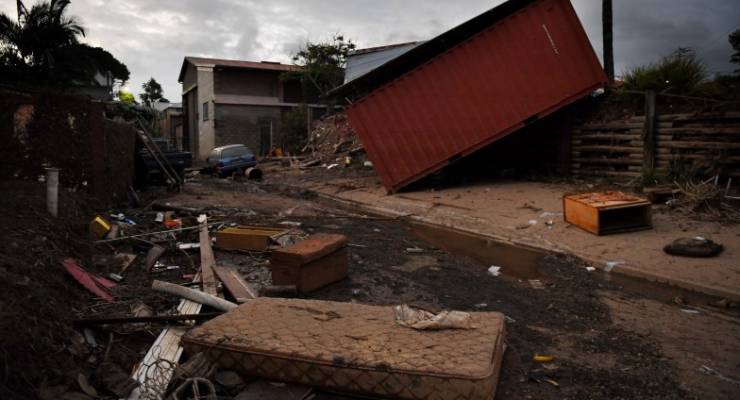
Crikey readers took their time over the weekend to consider the predicaments of disaster-prone northern Australia, where insurance infrastructure is struggling to keep up with an increasingly severe climate. As readers pointed out, it’s not the only region that’s going to feel the coming storm. Meanwhile, readers tucked into the government’s response to Extinction Rebellion protests, and discussed the legacy of Penny Wong.
On insuring the apocalypse
John Bushell writes: I distinctly remember that in 2005/2006 Lloyds of London, MunichRE and SwissRE all stated that continued warming of the planet would render an increasing number of assets uninsurable in future. The February 2019 “global warming of 1.5 degree” paper by the International Panel on Climate Change demonstrates that mankind will need to reduce carbon dioxide emissions by some 7% per annum each year for the next 30 years to have any chance of retaining a habitable climate. This is a challenging goal considering that these emissions rose 1.7% globally in 2018. By continuing to insure fossil fuel assets the operation of which put many of their other insured assets at risk of damage or destruction and eventual diminution of the insurance market itself the insurance and reinsurance industry has managed to cleverly devise a self-destructive business model. I would call this an “own goal”.
Richard Shortt writes: Ah, more welfare payments that are not welfare payments, where will it end? George Christensen cannot have a free market economy and then try and bend the market because it does not suit him. The market, via insurance companies, sets the price, George. It’s based on their very well-honed calculations of risk. It’s a message to you and your constituents, you all should really listen.
Ken Dally writes: George Christensen and his climate change denying colleagues, along with the coal and gas mining sector, should be paying for subsidies to insurance in northern Australia. You broke it, you fix it. It’s the most equitable way.
On the government’s Extinction Rebellion crackdown
Philip W. Barton writes: The clear implication of anti-terror laws is now evident. Their main purpose is easily subverted for use against legitimate, non-violent protest against government action threatening our climate future. That has led to direct government permission for police violence and a huge lowering of trust in government.
Janet Nixon writes: Australia is on a forced march to a detention centre. In our digitised world total surveillance of any individual’s activities and preferences is already close to fruition. The tools to make use of this are already in the hands of the minister for Home Affairs. Conveniently ignoring that, far from being a crime, public protest is fundamental to democracy, Dutton speaks of fining protesters $40,000 and sending them to jail.
On Penny Wong
Paul Tucker writes: Penny Wong is difficult not to admire. She’s intelligent and determined enough to have been successful in a number of fields. She could certainly have been wealthier pursuing some corporate legal gig. But she appears to genuinely want to make a difference whilst not being overwhelmed by her own ambition. I’m glad she’s sticking around.
Send your comments, corrections, clarifications and cock-ups to boss@crikey.com.au. We reserve the right to edit comments for length and clarity. Please include your full name if you would like to be considered for publication.







Insurance company attitudes to claims after 2011’s devastating Queensland floods was so bad that Choice made the insurance industry one of the eight winners of its annual Shonky Awards. “Choice director of campaigns and communications, Christopher Zinn, said the actions of insurers in refusing to cover flood damage was the biggest consumer issue of the year.” Some 15% of claims (including 8,000 who thought they were insured but had their claims denied) were rejected. Yet, insurers typically pay out on 98% of claims.
Recall in this context the TIO flog-off. None of you will have head of it of course.
Flog-offs have helped create this problem of unaffordable or unavailable insurance in some regions.
Until the Territory LNP Government suddenly flogged-off the government-owned TIO (Territory Insurance Office) in 2014, TIO was a model for Australia according to the then head of the federal parliamentary committee on the development of Northern Australia, Warren Entsch. He said the NT was the only place in Northern Australia his committee visited where insurance was consistently available and affordable. “Everywhere else it was absolute crisis and market failure, and when you could actually get it you couldn’t afford it … When you compare house and contents prices, there was about a $400 or $500 difference between places in Melbourne and Sydney and Darwin. Using the same comparison with North Queensland, if you could get insurance the difference was $3,000-$5,000 more”.
Katherine residents expected flood insurance premiums to more than double – if it is available at all after the TIO flog-off. But, yes, they were wrong – premiums went up by up to six times.
Cross-subsidisation meant that – unlike private insurers – TIO (and the other State government insurers until they too were closed) offered the same rate for home flood protection regardless of location anywhere in the Territory. Analysts now expect premiums in flood-prone towns like Katherine, 300 kilometres south of Darwin, to increase by several thousand dollars. One example was a private insurers home insurance policy for a house in north Katherine being about 270% more expensive than TIO’s. Katherine is a designated flood-risk area. Not only would such insurance be a heavier impost on business, its unaffordability could result in emergency service workers refusing to provide help in a flood, and instead staying home to protect their possessions.
In northern Queensland the inability of some businesses to get insurance, affordably or at all is now a huge problem. Rabid economic fundamentalist claims that price signals will balance risk with efforts at self-protection are insultingly absurd; regions cannot afford to lose businesses and other community entities just because they are priced out by insurers.